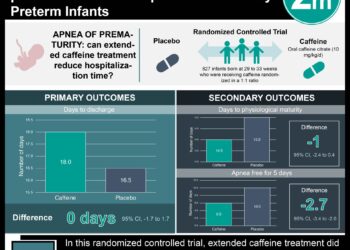Caffeine intake among youth remains stable, but sources vary
Image: PD
1. Among individuals 2-22 years of age, dietary recall from the National Health and Nutrition Examination Survey to assess caffeine intake showed mean caffeine intake among children and adolescents has remained steady in the past decade.
2. Soda was found to be the main source of caffeine for children and young adults 2-22 years old, though its consumption appears to be declining in favor of coffee and other caffeine sources among all age groups.
Evidence Rating Level: 2 (Good)
Study Rundown: With the recent entry of energy drinks to the beverage market, caffeine consumption trends among children and adolescents are of growing interest to health care providers and policy makers. Excess caffeine intake can lead to hyperactivity, anxiety, and tachycardia. Caffeine consumption among children and adolescents is of particular concern due to potential negative long-term health implications and is discouraged by health professionals. While there has been some research into caffeine consumption, there is no nationally representative pediatric caffeine consumption data and this retrospective analysis is the first to examine caffeine consumption in the context of new caffeine sources such as energy drinks. Caffeine intake among children and adolescents 2-22 years of age, was stratified based on age, race and socioeconomic status. Researchers found that the proportion of children and adolescents consuming caffeine was 73% at the end of 2010, which did not differ significantly from the amount of consumption in 1999. While soda was the main source of caffeine, its consumption decreased among all age groups during the study period. The proportion of caffeine intake from coffee and energy drinks increased. This study is limited by possible recall bias from survey participants. The trends seen in this study emphasize the value of monitoring how sources of caffeine and caffeine intake change among youth over time.
Click to read the study in Pediatrics
Relevant Reading: Health effects of energy drinks on children, adolescents, and young adults.
Study Author, Dr. Amy M. Branum, PhD, MSPH, talks to 2 Minute Medicine: Division of Vital Statistics, Reproductive Statics Branch at the Centers for Disease Control and Prevention, National Center for Health Statistics, Hyattsville, Maryland.
“Between 1999 and 2010, mean caffeine intake among US children, adolescents, and young adults remained stable, although the contribution of soda, historically the largest source of caffeine in the diets of children and teens, decreased. During this time coffee and energy drinks increasingly contributed to caffeine intake among children and now account for approximately 25 percent and 5 percent, respectively, of caffeine intake among 6-22 year-olds in the United States. “
In-Depth [retrospective study]: This retrospective analysis used data from the National Health and Nutrition Examination Survey (NHANES) 24-hour recall of food and beverage consumption among participants 2- 22 years old during 1999-2010. Caffeine content was calculated for self-reported dietary intake. Results were further stratified based on gender, age, race/ethnicity and income level as a percentage of the federal poverty line (PIR). Approximately 73% of children reported consuming caffeine on a given day, with higher income children more likely to consume caffeine than those below the poverty threshold (P < .01). There was no significant change in mean caffeine intake among young adults and adolescents. There was a significant decrease in the proportion of total caffeine intake from soda for all age groups (47% to 27% 2-5 year olds, P < .01; 60% to 39% for 6-11, 65% to 46% for 12-16, 62% to 40% for 17-18 and 62% to 34% for 19-22 year olds, all P < .001). At the same time, the proportion of caffeine intake from coffee showed a statistically significant increase in all age groups- 2% to 5% for 2-5, 2% to 9% among 6-11 year olds, P < .05; 5% to 12% among 12-16, 15% to 29% among 17-18 and 14% to 34% among 19-22 year olds, all P < .001). Energy drinks did not have a market share until 2001, after which 12-16, 17-18 and 19-22 year olds showed increases in consumption from 0 to 3% (P < .01) , 2% and 10% (P < .001) in 2010, respectively.
©2012-2014 2minutemedicine.com. All rights reserved. No works may be reproduced without expressed written consent from 2minutemedicine.com. Disclaimer: We present factual information directly from peer reviewed medical journals. No post should be construed as medical advice and is not intended as such by the authors, editors, staff or by 2minutemedicine.com. PLEASE SEE A HEALTHCARE PROVIDER IN YOUR AREA IF YOU SEEK MEDICAL ADVICE OF ANY SORT.








